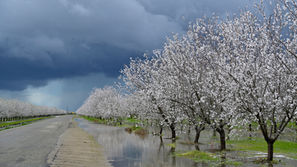Twin fires hit old Madera
- Jun 27, 2017
- 4 min read
Citizens and business owners rallied to repair and rebuild

Courtesy of Madera County Historical Society No one could guess by looking at this photo of Madera’s Yosemite Avenue in 1890 that two fires had destroyed about half of the buildings on the north (left) side of the street.
For the first eight and one-half years of Madera’s existence, she was spared the horrors of a major downtown fire. Then came 1885, and her luck ran out.
In two successive years, Madera suffered dangerous conflagrations, and it was only through the pioneer persistence of the founders of the town that it ever recovered.
On the evening of June 18, 1885, a fire broke out in what had formerly been Barnett’s drug store but had been recently occupied by Mary Plate, a widow with three children who lived on the premises and operated a candy store. Mrs. Plate and her children had just gone to bed when one of her kerosene lamps exploded, causing the fire.
The flames quickly spread east and west, taking Ragsdale’s Blacksmith and Wheelwright shop on the east of Mrs. Plate’s place and Merino’s Blacksmith Shop on the west. The fire also threatened the Arlington Hotel.
The fact that downtown Madera was spared complete destruction was due to the quick work of citizens who rushed to the scene and “worked like beavers” to keep the flames from spreading. At the time, Madera did not have a fire department.
Madera had no sooner recovered from the 1885 fire than another conflagration broke out on June 15, 1886. This one began in the old wooden train depot at 10:30 p.m. No one ever found out how the fire started, but more than a ton of gunpowder lay on the platform and simply burned like sawdust. Miraculously it did not explode.
The fire spread from the depot to Mace’s Hotel and then up east Yosemite Avenue. By morning most of the north side of main street was in ruins.
The loss of Mace’s Hotel was a severe blow to the local economy. The tourist season was at its peak, and Madera could ill afford to lose the revenue. Madera’s plight elicited strong expressions of encouragement from surrounding communities, especially Fresno. On July 20, 1886, a reporter from the Expositor wrote, “The people of Madera, who were sufferers of the recent fire, should not feel discouraged but should build again in a more substantial style. Madera is bound to be a town of prominence as it is surrounded by as fine a body of land was there is in the state. ... Madera has seen its worst days, and a bright future awaits it.”
Naturally the entire town was elated to learn of the Captain Mace’s intent to take the Expositor’s advice and rebuild, but not with lumber—this time it would be brick.
Coincidentally, among her other business operations, Madera had a brick factory operated by Chinese workers. It was located on the south side of town, near the 6th Street lumber mill, and the Captain took full advantage of its proximity by ordering enough bricks to build a new hotel two stories high and 54 feet by 100 feet. That same brick building still stands today on the northeast corner of Yosemite Avenue and E Street.
The official rebuilding of Madera after the fire of 1886 was initiated on Nov. 22, 1886, when Captain Mace hired Joseph L. Smith to prepare plans and specifications for his new hotel. It was to be an L shaped building with a kitchen, dining room, 39 bedrooms, bar, office, parlor, and halls, etc. In December the contracts for building the hotel were awarded. Smith and Poor got the job of completing the woodwork, and T.T. Barret won the contract to do the mason work and plastering. Construction was performed at a breakneck speed, and the new “Yosemite Hotel” was opened to the public on April 10, 1887.
In the months that followed the opening of Mace’s hotel, a flurry of building and rebuilding along Yosemite Avenue struck the rest of downtown Madera. A mood of optimism swept through the town, and business began to boom.
After 10 years of hostile neglect, even the Southern Pacific saw the handwriting on the wall. Madera was here to stay, and its presence was a financial asset for the railroad. In a major reversal of corporate policy, the Southern Pacific decided to assist Madera in rebuilding after the 1886 fire. The help came in the form of a new train depot, courtesy of the Big Four.
On June 27, 1886, construction began on Madera’s depot. It included a building 40 feet by 120 feet with all of the necessary porches and platforms. Built on the site of the original depot, which had been constructed by the citizens of the town, the new depot represented the end of an era of enmity between the town and the railroad. That hostility dissipated in the smoke of the 1886 fire that destroyed the “miserable hut” which had once marked the forced presence of the Southern Pacific in Madera.
Madera’s basic economic foundations remained strong after the fires of the 1880s; the Madera Flume and Trading Company kept lumber flowing out of the mountains to its mill in town, and the Yosemite Stage and Turnpike Company kept its stages full of tourists, who spent their money in Madera while waiting for a ride to see the wonders of Yosemite. The resiliency of the town’s founders had proved sufficient to insure its survival against the twin fires that had threatened to wipe Madera off the map.





















Comments